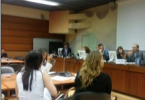
Rabab Ayesh
The situation in Yemen has dramatically worsened as the country enters its second month of the ongoing war. As a result of the dire political situation Yemen faces, the lives of many people deteriorate day after day.
The crisis has not only affected the standard of living of citizens, but has largely affected citizens’ health. The negative impacts of the financial crisis can be seen clearly on every corner in Yemen. Streets, buildings, squares, and malls are telling different stories of suffering and hardships that the Yemeni people face every day.
Several Yemeni residents have found that it is extremely hard to afford life with such complex circumstances. Civilians with low levels of income continue to bear the brunt of the interminable conflict.
Yemeni’s suffering is countless: the constant power cuts, the absence of oil, the lack of access to former means of income, the rising of prices, the lack of food, and intense fighting are some challenges that are frequently highlighted and given much concern. However, the issue of the increasingly scarcity of medications is entirely neglected by many.
Data on patients’ adherence to medications for chronic diseases are dearth if not missing. Meanwhile, there is a dearth of data that tells and reveals to what extent the financial crisis has influenced Yemeni patients’ adherence to therapy. The issue of medication remains neglected, especially in the throes of the escalated political events and bloody conflicts in Yemen.
The humanitarian consequences continue to be dire for millions of Yemenis. Though all Yemeni people have been affected by the current crisis in one way or another, it seems to be more visible to people of low income.
“My son has been suffering from diabetes since 2010 and we hardly could afford to buy the necessary medication for him. The current crisis left my husband with no way to get money,” said Fatima Abdul-Ghani. “My husband is an English teacher at a private school in Sana’a and he has a taxi that helps him to gain more money to spend on his family and on the insulin my son receives. As a result of the lack of access to the former methods of getting money, we had him lower the dosages because we all know that insulin is very expensive to be purchased with our low level of income.”
Many observers stress the need for urgent medical aid as a response to the current economic collapse in Yemen, especially for certain low-income population groups. Mohammed Nasr, a pharmacy owner in Sana’a said, “Patients with chronic diseases have started to treat only life-threatening problems and neglect the medications of less significance.”
The hazardous manifestations of Yemen’s political crisis appear clearly on those who have patients with chronic diseases. Families are starting to think of solutions to solve the problems of their patients. Some think of alternatives to expensive medicines.
“Many patients have changed their medications by themselves to cheap and low quality medications they used in the past or have skipped dosages. Others have completely dismissed or skipped the minor and less serious medication dosages. “They do all this without consulting their doctors,” said Mohammed.
As the conflict escalates, people’s suffering is becoming more serious. Many breadwinners have been staying home since the beginning of the Saudi-led coalition’s war in Yemen. The means of gaining money of the past are no longer effective. Builders, taxi drivers, private sector employees, and many other workers in different fields are seriously affected by the crisis.
Ali Al-Shami, a construction worker in Sana’a and a father of seven children, shared with National Yemen his suffering due to the current crisis and lack of business. It has been 6 years since Ali’s wife started taking hypertension medications.
“Before the current crisis started, I used to work day and night to gain money to afford the necessary medication for my sick wife, and to insure a respectable living for my seven children. Things used to go the way I wished and it was easy to find work at any time,” he stated.
“As the situation worsened, it became a real challenge to find work. I started to look for any work so that I could get money to provide the necessities for my family but all my efforts were in vain. As a result, my wife stopped taking her hypertension medications. Since then, her health started to get worse and I am afraid if the situation continues this way I will lose my wife,” Ali added.



